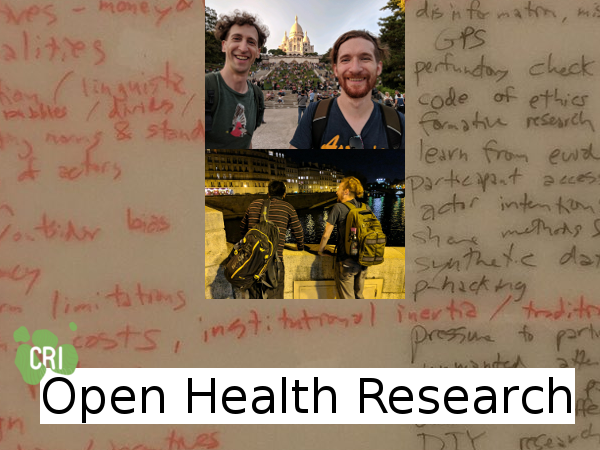Open Health Research
workshop at the CRI


Jon Clucas
October 17, 2018
On the heels of the preprint “Be the Change You Seek in Science” by our own Mike and Arno, Arno and I joined Anirudh at the CRI in Paris where the three of us co-chaired a workshop from October 10‒12, 2018 called “Open Health Research” with Jason Bobe and Anna McCollister-Slipp.
The online suggested action list “Ways to promote the practice of open science today” created for Mike and Arno’s editorial served as a jumping-off point in the form of a pair of Google Docs: a present-tense recommended actions list and a draft of future steps. I took notes in a Google Doc as well; each of these documents, including “Ways to promote the practice of open science today,” were (and are) open to public comments, suggestions and edits.
I was impressed with the variety of expertises represented in the room each day of the workshop. I’m keenly aware that many ideas that seem obvious would never have occurred to me, eg:
- research tends to be conducted by researchers with an insider-outsider bias with respect to both the general population and particularly with the populations being studied; non-researchers should be included in all stages, from formulating research questions through article review;
- institutional review boards (IRBs) exist to strengthen research and should be included actively rather than treated as barriers to be perfunctorily dealt with;
- on sufficiently large teams, methods could be written, preregistered and reviewed by one sub-team and carried out by a non-overlapping sub-team (ie, completely different people) to greatly increase the likelihood of clearly replicable documentation;
- in each of our CVs, we can include data and analyses as well as publications; and
- when citing references, we can include assessments of accessibility and openness.
The notes document runs over 20 pages; the examples above are simply personally relevant highlights.
One outcome of this workshop, in adition to the living documents referenced above, will be a PLOS Computational Biology Ten Simple Rules editorial article tentatively titled “Ten Simple Rules for Open Health Research.” The article is currently available as a preprint.
At the time of this writing, the ten simple rules for ethical open health research with human subjects are:
- Integrate ethical principles.
- Involve non-scientists.
- Clarify roles and rewards.
- Replicate prior work.
- Make research reproducible.
- Document everything.
- Present and publish accessibly.
- Emphasize research significance.
- Advocate open principles.
- Take calculated risks.
“Ways to promote the practice of open science today” includes a Disqus thread at the bottom for suggestions and revisions to be incorporated into the list of suggested practices. A mailing list is forthcoming, as are polished lists of recommended resources and actions.